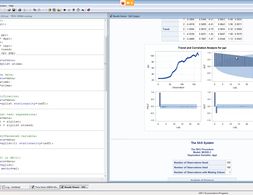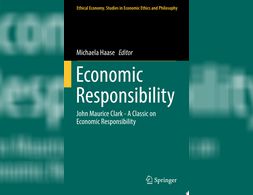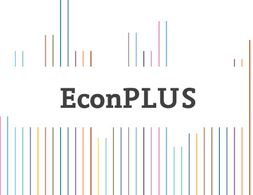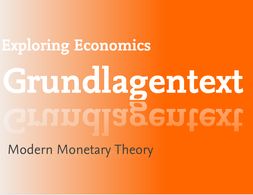1120 Ergebnisse
Der vorliegende Sammelband unternimmt in einer Zusammenführung von didaktisch reflektierten Erfahrungsberichten erste Schritte in Richtung einer pluralen sozioökonomischen Hochschullehre In der Einleitung führen die Herausgebenden die zentralen Begründungskontexte für dieses Vorhaben zusammen die evidenzbasierte Problematisierung standardökonomischer Hochschullehre steht dabei studentischen Forderungen und konkreten Alternativen gegenüber die von ökonomischen Fachwissenschaftler innen …
In den letzten Jahrzehnten ist es wiederholt zu Crashs und Stagnation auf den Finanzmärkten gekommen. Wiederkehrende Finanzkrisen sind ein Indiz dafür, dass Finanzmärkte latent instabil sind. Zentralbank und Staat (Regierung) mussten intervenieren, um die Finanzmärkte in einer Krise zu stabilisieren.
Course goals Learn about women men and work in the labor market and the household Learn to apply the tools of economic analysis to these topics and deepen understanding of these tools Develop the skills to think critically about gender issues including policy interventions Enhance understanding of how to analyze …
This course has dual purposes, to introduce students to the various stages of research and to provide an introduction to feminist perspectives on the politics of producing knowledge. Each student will learn how to be an interdisciplinary researcher while coming to understand the opportunities that feminism presents as a way of seeing, knowing, and representing the world.
Die übergeordnete Forschungsfrage des Projektsseminars lautet: „Können Low-Profit-Investitionen einen zusätzlichen Beitrag zur Umsetzung der SDG leisten?“
This graduate-level course examines issues related to women’s paid and unpaid work during a time of rapid integration of world markets. Students will analyze the role of government policy, unions, corporate responsibility, and social movements in raising women's wages, promoting equal opportunity, fighting discrimination in the workplace, and improving working conditions.
The goal of the course is to deepen students’ understanding of the Latin American development experience by viewing it through a gender lens.
Laut Bundesfinanzministerium dient die Schuldenbremse der Sicherung der langfristigen Tragfähigkeit der Haushalte von Bund und Ländern, sowie der Sicherung der finanziellen Handlungsspielräume zur Erfüllung der staatlichen Aufgaben. So ist es im Grundgesetz in Artikel 109 festgeschrieben. Artikel 115 erläutert näher, dass der Bund strukturell, also unabhängig von der konjunkturellen Lage nur Nettokredite im Rahmen von 0,35% des Bruttoinlandproduktes vornehmen darf.
The podcast discusses how to deal with the rising inflation and presents a comparative perspective between the US and the EMU. Basically the speakers discuss whether we are heading to a stagflation in Europe similar to the 1970s and they compare the macroeconomic dynamics in the United States vs. the EMU.
There are three things one can do on this website - 1. Learn 2. Help Teach 3. Sign up for the MOOC.
The Microeconomics of Complex Economies uses game theory, modeling approaches, formal techniques, and computer simulations to teach useful, accessible approaches to real modern economies.
John Maurice Clark’s article “The Changing Basis of Economic Responsibility,“ published in the Journal of Political Economy, is the topical starting point for all scholars interested in economic responsibility and responsible economic action.
As a response to ongoing economic, social and environmental crises, many private actors have enlarged their definition of 'value' to include environmental and social elements. Such practices, however, appear incompatible with the current epistemological structure of academic financial discourse.
Smith contends that there is no possible solution to our global ecological crisis within the framework of any conceivable capitalism. The only alternative to market-driven planetary collapse is to transition to a largely planned, mostly publicly-owned economy based on production for need, on democratic governance and rough socio-economic equality, and on contraction and convergence between the global North and South.
The third edition of Political Economy: The Contest of Economic Ideas is a fully updated overview of the political economy and its connection with social concerns. This book investigates the main traditions of economic ideas and provides a 'big picture' overview of the analytical tools and value judgements associated with competing schools of economic thought.
Uncertain Futures considers how economic actors visualize the future and decide how to act in conditions of radical uncertainty. It starts from the premise that dynamic capitalist economies are characterized by relentless innovation and novelty and hence exhibit an indeterminacy that cannot be reduced to measurable risk.
One of the most authoritative authors on the intellectual heritage of John Maynard Keynes, Robert Skidelsky draws a sketch of the great man's economic thinking both accessible and insightful.
Adam Smith and Karl Marx recognized that the best way to understand the economy is to study the most advanced practice of production. Today that practice is no longer conventional manufacturing: it is the radically innovative vanguard known as the knowledge economy.
Financial Evolution at the Speed of Thought A new evolutionary explanation of markets and investor behaviorHalf of all Americans have money in the stock market yet economists can t agree on whether investors and markets are rational and efficient as modern financial theory assumes or irrational and inefficient as behavioral …
Since 2007, central banks of industrialized countries have counteracted financial instability, recession, and deflationary risks with unprecedented monetary policy operations. While generally regarded as successful, these measures also led to an exceptional increase in the size of central bank balance sheets. The book first introduces the subject by explaining monetary policy operations in normal times, including the key instruments (open market operations, standing facilities, reserve requirements, and the collateral framework).
Eco-modernisation’s promise that technological fixes will provide us with the efficiency we need to decouple environmental burdens from economic growth suggests that business-as-usual can continue. Today’s guest Timothée Parrique is the best to explain why this is not happening and why relying solely on technological solutions is like betting on green zero in roulette.
Our public services are in dire need of investment. But in the middle of a debate over competing spending plans, isn’t it also time to ask what we want our public services to actually do for us? That’s the view of group of economists and campaigners who are pushing for something called ‘Universal Basic Services’ – a radical expansion of high-quality public services for all to areas like transport, childcare and social care.
Jede Finanzkrise ist in erster Linie eine Schuldenkrise. Schuldner_innen nehmen zu viele Kredite auf, die sie dann nicht mehr bedienen können. Gläubiger_innen – vor allem Banken – müssen in der Folge ihre Forderungen abschreiben und vergeben weniger Kredite. Die Finanzkrise ist da.
Um eine solche Finanzkrise wirklich zu verstehen, muss man aber erst begreifen, wie Kredite eigentlich entstehen und wie genau Banken und andere Finanzinstitutionen funktionieren. Aufgabe einführender Bücher in die Volkswirtschaftslehre sollte sein, diese fundamentalen Zusammenhänge darzustellen. Leider stellen diese Bücher das Finanzsystem und die Kreditschöpfung meist falsch dar. Das erschwert sowohl die Analyse einer Finanzkrise als auch Wege zu ihrer Lösung zu finden.
Mit dem seit Ende März allseits konstatierten Beginn einer Wirtschaftskrise stellen sich vorrangig zwei Fragen: Inwieweit ist die Corona-Pandemie der Ausgangspunkt (oder gar die Ursache) dieser Krise? Und zweitens: Kann mit den beschlossenen Hilfsprogrammen eine tiefgreifende, langanhaltende Rezession verhindert werden?
Die verfassungsrechtliche Anerkennung zukünftiger Generationen als Subjekte mit eigenen Rechten ist eine juristische Neuheit – und stellt unsere Gesellschaft vor Herausforderungen, für die es keine einfachen Lösungen gibt. Ein Beitrag von Carla Reemtsma.
Das Ziel des Green New Deal ist es, eine „soziale und ökologische Transformation unserer Wirtschaft“ anzustoßen (Giegold und Mack 2012, S. 40). Doch inwieweit werden bei der sozialen Transformation auch feministische Anliegen mitgedacht?
Die Ergebnisse der Befragung belegen, dass die Lehrenden von einer Hierarchisierung der in der ökonomischen Analyse auftauchenden Begriffe ausgehen; die hauptsächlich für relevant gehaltenen Begriffe offenbaren hierbei eine spezielle konzeptionelle Sichtweise (Identifikation eines „mainstream“). Laut den Befragten ist der Mainstream durch Konzepte und Methoden gekennzeichnet, die sich im Gedankengerüst der neoklassischen Denkschule bewegen. Als relevantestes Merkmal des Mainstreams beschreiben die Befragten das Akteurskonzept des Homo oeconomicus sowie die Kategorien Rationalität, Gleichgewicht, Maximierung und Effizienz.
Wie der Staat Landeigentumsverhältnisse (über)sieht. Ein Beitrag von Felicitas Sommer.
Innovationspolitik ist relevant für eine klimabewusstere Zukunft – und ihre Relevanz geht über die generelle Förderung allgemein umweltbewusster Innovationen hinaus.
Die Rolle des Optimierungskonzepts in den Standardlehrwerken der Mikroökonomik Torsten Heinrich Quelle van Treeck Till and Janina Urban Wirtschaft neu denken Blinde Flecken in der Lehrbuchökonomie iRights Media 2016 Das Buch kann hier bestellt werden http irights media de publikationen wirtschaft neu denken Rezensierte Bücher Pindyck R S Rubinfeld D …
Die Modern Monetary Theory (kurz: MMT, dt: moderne Geldtheorie) ist eine geldtheoretische und makroökonomische Denkschule, bei der es hauptsächlich um die Analyse des Geld- und Kreditsystems und insbesondere um die Frage der Kreditschöpfung geht.
Es ist immer noch zweifelhaft, ob Ökonom*innen mit ihrem Instrumentarium die nächste Wirtschaftskrise vorhersagen können.
Als erster Grund ist dafür der nicht-systemische Status von Krisen in Mainstream-Theorien zu nennen. Zweifelsohne entwickeln empirisch arbeitende Makroökonomen Warn-Indikatoren für Finanzkrisen (Schularick und Taylor 2012), es gibt auch makroökonomsiche Modelle, die Krisendynamiken aufgreifen (Kumhof et al. 2015) und Debatten im Mainstream der VWL über den richtigen Umgang mit der Mathematik (Romer ABC).
Wir nutzen Cookies. Klicke auf "Akzeptieren" um uns dabei zu helfen, Exploring Economics immer besser zu machen!



























